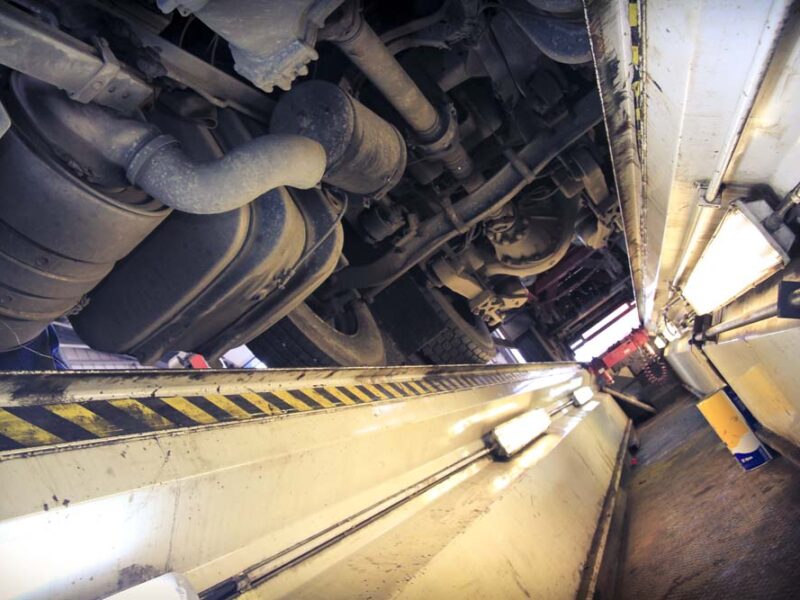During the recent Covid-19 pandemic and subsequent lockdowns by the UK Government, a number of emergency measures were put in place in order to address certain issues such as the shortage of HGV drivers. Having been able to make changes (due in most part to the UK no longer being in the European Union and the Government therefore being able to easily change the legislation regarding driver testing and licensing), the Government is now looking to explore whether there are any further opportunities to make changes to the legislation within the transport regulatory regime that would lead to economic benefits in the industry and "support economic growth by strengthening the supply chain".
One of the areas that the Government has identified is the rules around C1 provision. Under current rules, those with a standard car licence obtained after 1st January 1997 may only drive vehicles weighting up to 3.5 tonnes, unless they have taken additional tests to qualify for the C1 entitlement - which then allows them to drive a vehicle combination up to 8.25 tonnes (the vehicle must be between 3.5 and 7.5 tones plus a trailer with a Maximum Authorised Mass (MAM) of up to 750kg).
In the UK, up until 1st January 1997 drivers who passed their car driving test immediately gained entitlement to drive a light lorry or van (known as a C1 entitlement) without the need for any further training or testing. After 1st January 1997, due to the EU Second Driving Licence Directive, a separate test has been required to allow car drivers to have this entitlement, with those drivers who took their test prior to 1st January 1997 being given "grandfather rights" which allowed them to drive vehicle combinations (as specified above) up to 8.25 tonnes. Under the proposed review, this need for an additional test would be removed for all holders of a standard car licence (B entitlement).
The government's website is asking for views to be submitted by members of the public and industry professionals that will help to answer important questions regarding the "global driver shortage" and to assist research into how post-Brexit freedoms are to be used to remove "red-tape" and create opportunities for people and businesses across the country, without, as far as the transport industry is concerned, lessening any road safety standards already in place.
Currently in order to hold a C1 entitlement you must satisfy the following conditions:
- Be 18 years or over,
- Hold a category B entitlement,
- Undergo a medical assessment for initial application and then obtain signed medical reports in order to renew the entitlement once the age of 45 years is obtained, and then every 5 years up to the age of 65, where upon the medical report must be obtained annually.
- Those with current grandfather rights to a C1 entitlement, upon the age of 70 must submit a medical report that is subject to higher health standards than for a standard car licence in order to continue to hold the right.
- Those who took a C1 test have to make a self-declaration about their health every 5 years up to the age of 45.
- A Driver Certificate of Professional Competence (DCPC) may also be required to drive commercial goods vehicles on a C1 entitlement.
If the rules where to revert to pre-1997 rules, then the government proposal is that drivers must have/be:
- Minimum age of 17,
- Must have passed theory and practical driving tests in a car
- Practical driving test cannot include motorways,
- For professional drivers, the DCPC and the medical declarations are likely to remain in place.
These changes would remove a significant amount of administration for the haulage industry and the possibly the medical profession alike with all the subsequent savings in time and money that lifting that burden would produce and the requirement for professional drivers, who after all are the people doing the most driving hours on the UK's roads, to hold additional certifications still ensures that road safety is high on the legislative agenda, so this proposed change may well be a positive move by the Government.
In order to have your say on this matter, you can click here to complete the online form. The consultation period will run until 28th October 2022.
In the meantime, if you have any queries about the current C1 regime or any other matter that might be affecting your transport operation then do not hesitate to get in touch. Click here to send an email, or call 01279 818280 to speak with one of our lawyers. We are here to help.

More News and Insight

Social Media – Have you Thought about your Employees’ Use?
Social Media is all encompassing in the modern world, but although it brings many positives, it can place employers in vulnerable positions if their employees’ use is not carefully defined…

Changes to the Clandestine Entrant Civil Penalty Scheme means a Stitch in Time Really Does Save Nine!
The Clandestine Entrant Civil Penalty Scheme has been in place for over 20 years. It is designed to complement law enforcement activity against criminals who smuggle people into the UK illegally as well as deter those who decide to try to enter the country without permission…

Driving in the UK? Read about the latest Rule Changes in 2024
Earlier this year various new driving laws were introduced, impacting both standard road users as well as HGV and PSV road users across England, Wales & Scotland. If you are driving in the UK, especially if you are a commercial driver, then you should ensure that you are aware of these amendments and new rules…

Self-Driving Cars on UK Roads to be Reality by 2026
It seems that one of the first areas that will be breaking the ground in the AI revolution into most people’s everyday lives will be Self-Driving cars! Of course we have heard all this before, and more than once!

Are You Taking your Responsibilities to Maintain your Vehicles Seriously?
Running a haulage business is not an easy undertaking. There are a multitude of decisions to be made on a daily basis before any driver actually gets behind the wheel and delivers the goods (or passengers!).

Update to the Guide to Registering & Operating Local Bus Services in England & Wales
The Senior Traffic Commissioner’s guide to registering and operating local bus services in England and Wales is intended to help operators of local bus services understand the requirements for registering a service.

Changes to the HGV & PSV Test Regime for Earned Recognition Operators
In March 2021 the Government began a review into the processes for commercial vehicle testing to look at ways it could improve the regime for operators whilst still maintaining high safety standards for any vehicle used commercially on the UK’s roads.

Employment Law Updates for 2024
The Government has confirmed several legislative employment law changes to be implemented 2024, which aim to bring about a “fairer workplace for employees”.

Campaign to Bar Schools from using Section 19 Permits
In March 2024 a campaign was started to end the operation of minibuses by schools and colleges under Section 19 permits.

Moving to a Digital First Approach in Heavy Vehicle Testing
The DVSA has published an update to their digital transformation project for heavy vehicle testing. The update is for the new Manage Your Vehicle Testing (MyVT) digital service across vehicle testing.

Traffic Commissioner Highlights Abuse of Section-19 Permits
In a Section 19 Public Inquiry hearing heard last year (2023) the Traffic Commissioner highlighted again the importance of permit operators ensuring that their vehicles allow passengers and other road users to be safe.

Enero Logistics Ltd – the Law for Operators on Agency Drivers
At one time or another, many transport companies need to rely on the services provided by agency drivers, to best cope with sudden fluctuations in demand or to fill driver shortages. This allows for the undisrupted continuation of services by these organisations.
